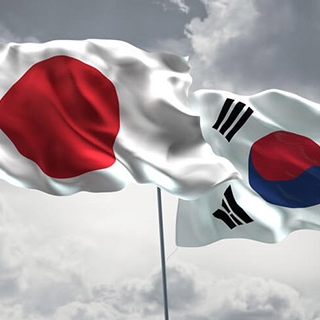


In the first batch of "tariff letters" sent to trading partners, U.S. President Donald Trump took aim at two of the closest U.S. allies in Asia: Japan and South Korea both are already bearing the brunt of the existing duties on auto and steel exports.
Additional tariffs would further hurt these two exports-dependent economies that are grappling with a slowdown in growth, with Japan likely staring at a technical recession, or two straight quarters of economic contraction.
Both Japan and South Korea saw first-quarter gross domestic product contract on a quarter-on-quarter basis.
While South Korean imports to the U.S. face 25% tariffs, the same as Trump promised in April, the rate on Japan has been raised by 1 percentage point to 25%.
Exports including services made up almost 22% of Japan's GDP in 2023, according to the latest data from the World Bank, and 44% of South Korea's GDP in 2023.
Currently, imports of automobiles and auto parts to the U.S. incur a 25% tariff, while steel and aluminum attract a 50% levy on most countries.
Automobiles are Japan's largest exports to the U.S. and are also among South Korea's top exports. South Korea was also the fourth-largest exporter of steel to the U.S. in 2024, according to the International Trade Administration under the U.S. Commerce Department.
Japan's Prime Minister Shigeru Ishiba reportedly said the country "actively seeks the chance of an agreement that benefits both countries, while protecting Japan's national interest." In May, Ishiba said that his country will not accept a deal that does not see the removal of auto tariffs.
The newly announced tariffs will lower Japan's GDP by 0.1 percentage point by end-2026, according to Norihiro Yamaguchi, Lead Japan Economist at Oxford Economics.
"Given that the economy is already suffering from high tariffs on auto and elevated global trade policy uncertainly, and also weak consumption, the impact shouldn't be dismissed," he told CNBC
Yamaguchi said that Japan's economy will "barely grow" in the second half of 2025 and in the first half of 2026, if not falling into a recession.
The U.S. is Japan's largest export market, with 21.3 trillion yen ($145.76 billion) of shipments to the country in 2024, while South Korea exported goods worth $127.8 billion to the U.S. in the same year, and counts the U.S. as its second-largest export market.
Reflecting a "more intensified tariff policy stance," the Bank of Korea in May nearly halved GDP growth estimates for 2025 to 0.8% from February's projection of 1.5%.
"The recovery in domestic demand has been delayed, while export growth is expected to slow further due to the impact of U.S. tariffs," the BOK said.
Frederic Neumann, Chief Asia Economist at HSBC told CNBC that should Japan and South Korea fail to reach a deal, these tariffs will pose "considerable headwinds to growth."
Both Japan and South Korea are already facing sluggish domestic demand.
Source: CNBC
Federal Reserve Chair Jerome Powell on Thursday responded to a Trump administration official's demands for information about cost overruns for a renovation project at the central bank's Washington hea...
The United States Commerce Department is set to impose preliminary anti-dumping duties of 93.5% on graphite imported from China after concluding the materials, which are a key component for batteries,...
U.S. President Donald Trump's decision to ramp up arms shipments to Ukraine is a signal to Kyiv to abandon peace efforts, Russia said on Thursday, vowing it would not accept the "blackmail" of Washing...
Federal Reserve Governor Adriana Kugler said the US central bank should keep interest rates steady "for some time," citing accelerating inflation as tariffs begin to push up prices. "Given the stabil...
Unemployment claims fell 7,000 to 221,000 in the week ending July 12, compared with the median estimate of 233,000, according to Labor Department data. The estimated range was 220,000-240,000 accordi...
Australian equities notched a record high as Asia-Pacific markets tracked Wall Street gains on the back of strong U.S. economic data reports and a slew of better-than-expected corporate earnings. Australia stock markets climb to record...
The Japanese yen rose to around 148 per dollar on Friday, rebounding from a significant drop in the previous session, as investors digested the latest inflation data. Headline inflation ticked down to 3.3% in June 2025 from 3.5% in May, yet it...
The Nikkei 225 Index rose 0.3% to 40,034, while the broader Topix Index also climbed 0.3% to 2,847 during Friday morning trading, marking the second straight session of gains. The advance followed a rally on Wall Street on Thursday, supported by...
 U.S. consumer prices increased by the most in five months in June amid higher costs for some goods, suggesting tariffs were starting to have an...
U.S. consumer prices increased by the most in five months in June amid higher costs for some goods, suggesting tariffs were starting to have an...
 European stocks erased early gains and closed mostly lower on Tuesday as markets continued to assess how potential tariffs from the US may hurt...
European stocks erased early gains and closed mostly lower on Tuesday as markets continued to assess how potential tariffs from the US may hurt...
 President Donald Trump's renewed calls for Federal Reserve Chair Jerome Powell's resignation have prompted investors to protect portfolios against...
President Donald Trump's renewed calls for Federal Reserve Chair Jerome Powell's resignation have prompted investors to protect portfolios against...
 The annual core consumer price inflation rate in the United States, which excludes volatile items like food and energy, ticked up to 2.9% in June...
The annual core consumer price inflation rate in the United States, which excludes volatile items like food and energy, ticked up to 2.9% in June...